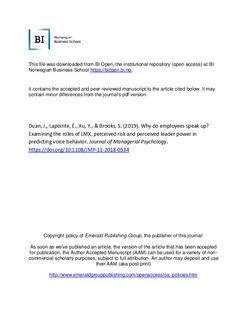Why do employees speak up? Examining the roles of LMX, perceived risk and perceived leader power in predicting voice behavior
Journal article, Peer reviewed
Accepted version
Permanent lenke
http://hdl.handle.net/11250/2628264Utgivelsesdato
2019Metadata
Vis full innførselSamlinger
- Publikasjoner fra CRIStin - BI [1015]
- Scientific articles [2173]
Originalversjon
10.1108/JMP-11-2018-0534Sammendrag
The purpose of this paper is to understand better why employees voice. Drawing on social information processing theory and insights derived from the literature on power, the authors suggest that leader–member exchange (LMX) fosters voice by reducing the perceived risk of voicing. The authors further contend that high perceived leader power will strengthen this mediated relationship.
The authors relied on a sample of 265 employee-supervisor dyads collected from Chinese organizations to test the study hypotheses.
Results indicated that perceived risk of voicing significantly mediated the positive LMX–voice behavior relationship. In addition, perceived leader power strengthened the effect of LMX on voice behavior via perceived risk of voicing. The relationship of LMX to perceived risk of voicing was more negative, and the indirect effect of LMX on voice behavior was more positive when employees perceived that leader power was high.
Organizations seeking to promote voice behaviors should support leaders to develop high-quality relationships with employees. Organizations should also ensure that leaders are sufficiently empowered to fulfill their roles, and ensure that employees are aware of their leaders’ influence.
Findings suggest that, in the context of high quality leader–member relationships, employees’ perceptions of their leaders’ power may help to overcome barriers associated with speaking up. Thus, this study helps explain the conditions that encourage employees to voice.
